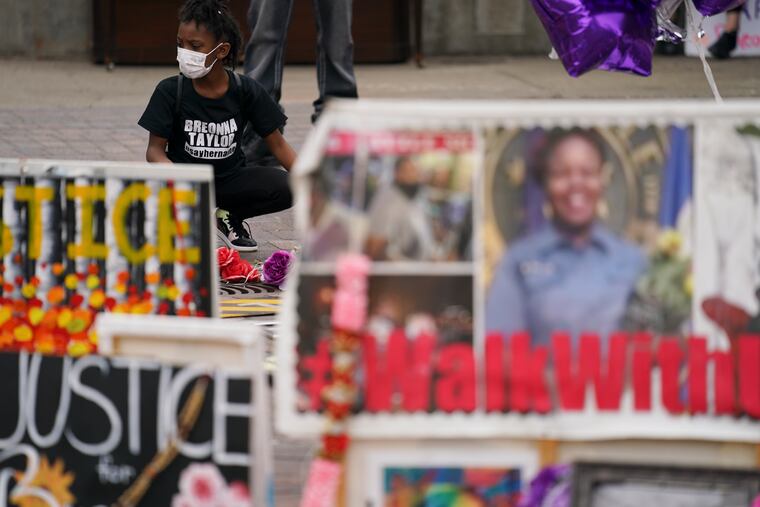The Breonna Taylor investigation: A Q&A
Some questions and answers about Kentucky Attorney General Daniel Cameron’s findings in the case.

LOUISVILLE, Ky. — Six months after Breonna Taylor was fatally shot by police in her Kentucky apartment, a grand jury delivered a long-awaited answer about whether the officers would be punished.
The jury on Wednesday did charge one of the officers, Brett Hankison, with three counts of wanton endangerment for firing shots that went into another home with people inside.
But jurors didn’t indict any of the officers on charges directly related to Taylor’s death. The jury relied on evidence presented to it by Kentucky Attorney General Daniel Cameron.
Cameron said the other two officers were justified in firing their weapons because Taylor's boyfriend, Kenneth Walker, had fired one shot at them.
Along with the killing of George Floyd in Minnesota, Taylor’s case became a major touchstone for the nationwide protests that have gripped the nation since May, drawing attention to entrenched racism and demanding police reform.
Some questions and answers about Cameron’s findings in the Breonna Taylor case:
Who was Breonna Taylor?
Taylor was a 26-year-old emergency medical technician who lived with her sister in an apartment in Louisville. She and her boyfriend, Kenneth Walker, had settled in to watch a movie in her bedroom on the night of March 13 when police came to her door with a narcotics warrant that was one of five issued that night in a wide-ranging sting. Minutes later, Taylor was fatally shot. Her death sparked months of protests in Louisville, and celebrities including LeBron James, Beyonce and Oprah Winfrey have called on authorities to criminally charge the police officers who were involved in the raid.
» READ MORE: Protesters march through Philadelphia in the wake of the grand jury ruling in Breonna Taylor’s death
How many times was she shot?
Cameron said that Taylor was shot six times on the night of her death, but only one of the gunshots was fatal. Sgt. John Mattingly had entered the home after the door was broken down, and he was shot once in the leg by Walker, Taylor's boyfriend. Walker has said he didn't know the police were at the door, and he fired a “warning shot," thinking it was an intruder. After Walker fired, Mattingly, Hankison and a third officer, Myles Cosgrove, returned fire, for a total of 32 gunshots fired by police.
Why was no one charged with shooting her?
Cameron said the fatal bullet was fired by Cosgrove, but added that Cosgrove and Mattingly were justified in the use of force because they were shot at first. Cameron said state law “bars us from seeking charges in Breonna Taylor's death.” Cameron also said there was no conclusive evidence that any of Hankison's 10 gunshots hit Taylor inside her home. But Hankison was charged with three counts of wanton endangerment for firing shots that went into another home with people inside.
» READ MORE: Dismay over Breonna Taylor spills into America’s streets
Why was Officer Brett Hankison given a $15,000 bond?
Hankison, who was fired from the Louisville department in June, was the only officer charged by the grand jury. The first-degree wanton endangerment charges are Class D, the lowest level felonies in Kentucky, which have a sentencing range of one to five years in prison upon conviction. When Hankison was fired, interim Police Chief Robert Schroeder said that Hankison showed “extreme indifference to the value of human life" when he fired “blindly” into Taylor's home.
Will there be any other charges?
Cameron said it is unlikely there will be any further criminal charges coming from his investigation from the night of the shooting. Lawyers for Taylor's family had called for a minimum of manslaughter charges. Cameron said his team “walked the grand jury through every homicide offense and then the grand jury was the one that made the ultimate decision.”
Federal officials are continuing to investigate whether the officers committed any civil rights violations, and that probe is also investigating a fourth officer, Joshua Jaynes, who sought the warrant for Taylor’s home. Louisville Mayor Greg Fischer also said Louisville police are conducting a professional standards investigation to look into if any officers involved in the raid that night need further training or discipline.